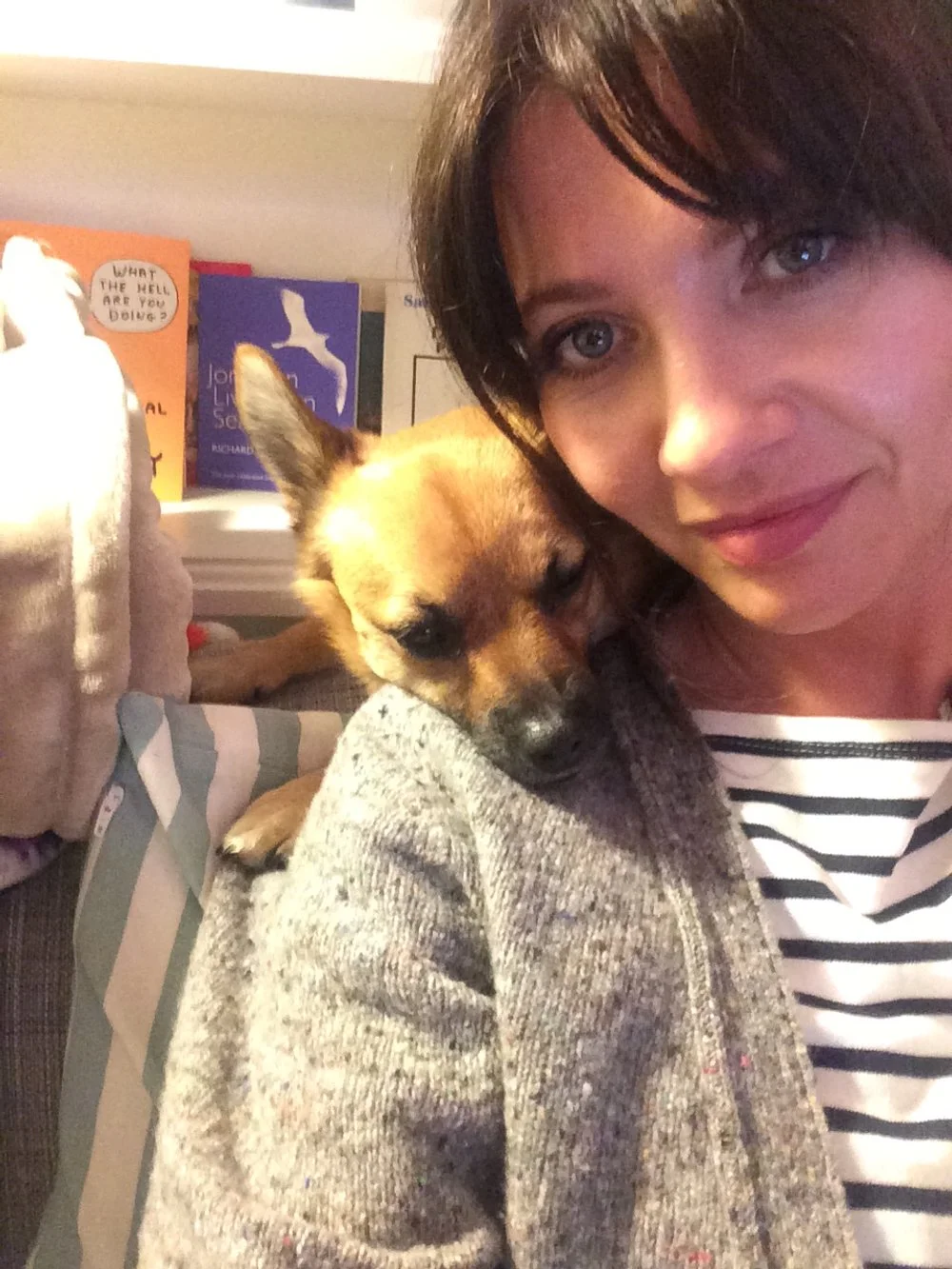Does this sound familiar to you?
“The second I leave, my dog barks and howls non-stop.”
“I love my dog but his separation anxiety is ruining my life.”
“My dog’s separation anxiety is beyond hopeless, I’ve tried anything and everything and nothing seems to work.”
I totally get it, I’ve been there myself with my little dog Wolfgang.
It’s heart wrenching, it’s stressful and it’s alienating.
And you’ve probably tried it all…
Leaving your dog to cry it out
Trying toys and food as a distraction
Crating your dog
Calming aids for dog separation anxiety
…and are feeling deflated and out of options!
Why this training is different
I know your bond with your dog is unique, and so is each dog’s journey through overcoming separation related issues. That is why all my separation training programmes are tailored to the individual dog’s specific needs.
A holistic approach, taking an in-depth look at your dog’s history and distinctive requirements to be able to be happy home alone. I do this using my insights and experience from working with well over 1,000 dogs over the last 9+ years and tailoring them to your dog's specific needs and environment.
Whether your aim is to leave your dog home alone for one hour or four hours +, I’m here to guide you and your dog every step of the way.
Our Separation Anxiety Story
When you work with me, you're not just getting a qualified Dog Trainer and Separation Anxiety Behaviour Consultant, you're getting a trainer who has dealt with separation anxiety first hand.
My little girl Wolfgang went from happy when home alone to barking and howling when I stepped outside for only 1 second, after we moved home (…and country).
It was heart wrenching, it was stressful.
And it took dedication and a tailored approach to get her back to her happy place and now I can leave her home alone again, safe in the knowledge that she’s ok. So I understand how restrictive, stressful and heartbreaking it can be to live with a dog who suffers with separation related problems.
Wolfgang is the reason why I became specialised in separation related behaviour problems. Going through this was really challenging, even as a trainer.
And it’s become my absolute passion to help other dog guardian’s to understand the why’s and how’s, to guide and motivate you through this training journey.
Plus, having trained well over 1,000 dogs over the last 9+ years, provides me with plenty of experience and unique insights into the ins and outs of dog behaviour (away from separation anxiety) which allows me to take a holistic approach to each and every individual client’s case.
My Services
The Initial Consultation
€30
The Separation Training Starter Pack
€244
The 8-week Comprehensive Separation Anxiety Training Programme
€544
I work with clients worldwide
My bespoke remote Separation Anxiety training programmes allow me to work with you wherever you are.
Training is held in English or German.
FAQs about dog separation anxiety and how I work:
What causes separation anxiety in dogs?
Various factors can trigger separation anxiety in dogs, including a scary experience they underwent while alone (like a burglary, fire alarm, or noisy construction), relocating to a new home, being re-homed, losing a family member, experiencing a traumatic event (such as a car accident or a dog attack), or enduring frequent and prolonged absences from her owners.
Also, dogs can be genetically predisposed to separation related issues as well as dogs developing separation anxiety due to medical issues (for example pain/ discomfort)and cognitive dysfunction (in older dogs).
What is Separation Anxiety and what are the common signs?
Separation anxiety is part of a larger group of problem behaviours that we refer to as separation-related behaviours. By definition, separation-related behaviours are behaviours that only happen when the owner isn't at home. Or if they do happen at other times, they are displayed with greater intensity and duration and/or out of context when the owner isn't there
Typical signs of separation anxiety include behaviours such as excessive vocalisation (barking, howling, whining, crying), soiling the house (when the dog is otherwise toilet trained), excessive chewing often focused around entrances doors, floors, walls, windows) and panicked attempts to escape all the way to less obvious behaviours such as the dog hiding, getting anxious when you get ready to leave, low level whining and howling, trembling, excessive yawning, licking, drooling, panting and more.
All of those behaviours are stress signals and whereas some of these can also be attributed to being bored or frustrated, the fact is that your dog is not coping when home alone which means your dog needs help, whatever the underlying emotion may be.
How can I prevent separation anxiety in my dog?
For puppies, a little absence training from the start as part of your socialisation and habituation efforts is key. Establish a routine that includes alone time (with you at home and out of the home). For older or rescue dogs, systematic desensitisation to being home alone is important. Know what your dog can easily handle and gradually increase the time.
How long will it take to help my dog overcome separation anxiety?
Each dog is unique, and the duration of recovery varies significantly. It's common for it to extend over several months, but it's crucial to recognise that separation anxiety is a phobia, and altering a dog's emotional response requires patience and time.
Why does my dog destroy things when I leave?
When your dog destroys things when you leave, it can be a sign of separation anxiety or boredom/ frustration. Dogs with separation anxiety experience intense stress when left alone, which can manifest in destructive behaviours like chewing, digging, or tearing objects apart as a way to cope with their panic. On the other hand, if your dog doesn’t have enough mental or physical stimulation, they may destroy items simply because they’re bored and looking for something to do. To address this, it’s essential to determine the root cause first.
How to stop my dog barking when left alone?
To stop your dog from barking when left alone, it’s important to uncover and address the root cause of the behaviour. If the barking stems from separation anxiety, your dog isn’t barking out of defiance but rather fear and distress. if your dog is barking because they are bored or frustrated, ensure your dog’s physical and mental needs are met through regular exercise and enrichment activities like puzzle toys, which can keep them occupied and calm while you’re away.
How do I know if it will work for my dog?
The simple answer is, you won’t know until you’ve tried. There are never guaranteed results when it comes to dog behaviour modification. That said, I apply a holistic approach looking at all aspects of your dog’s day to day and the method I use (gradual exposure) is based in science of how to change a dog’s emotion and has helped thousands of dogs overcome the fear of being home alone.
Does getting another dog help my dog overcome their fear of being home alone?
It depends, as with most things in life, but usually it actually won’t help and here are a couple of things to consider: your dog’s anxiety comes from being separated from you, the human, not just from being home alone. So while another dog might make your dog less lonely, it’s not likely to cure your dog’s anxiety when you’re away. Also your current dog’s anxiety when you are not around may rub off on your second dog and then you have a double-trouble kind of situation.
How does the process work?
You can start by filling in my contact form and I’ll be in touch with information according to your needs. From there, I can talk you through how it all works and together we can figure out whether it is a good fit for you and your dog.
What will I need for the separation anxiety training programme?
A device (computer, laptop, iPad, mobile phone) to access video calls with (Zoom, Teams, etc) and a camera to monitor your dog with when you train. That’s it. And if needed, I’m happy to help with finding and setting up the right camera with you.
What is your service area?
Wherever you are in the world; as long as you can speak English or German, we can train together.
How is your separation anxiety training different from others?
The method I employ is based in science, presenting a straightforward and accessible plan accompanied by ample support and encouragement to guide you every step of the way. My experience gathered from many years of working with dog training and behaviour puts me in a perfect position to offer a holistic approach, considering all aspects of your dog’s life and how this may impact on their separation anxiety.
We are 100% in this together!
Do you have payment plans available?
Yes and please get in touch for further information on my payment plans.
Why is the training done remotely and why don’t you need to see my dog in-person?
Having a trainer in your home, whether that’s for the initial assessment or during other training times, will impact on your dog’s actual real-life behaviour and won’t enable us to realistically assess what’s going on. Plus, you need to work on this every day and not only when your trainer pops round.
My remote training programmes allow me to be there for you every day, guiding you along the training journey and turning you into the expert for your dog.
















